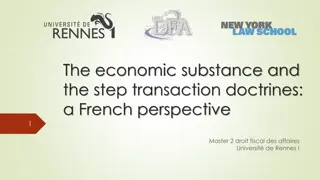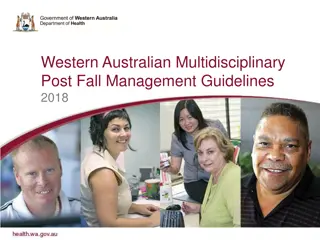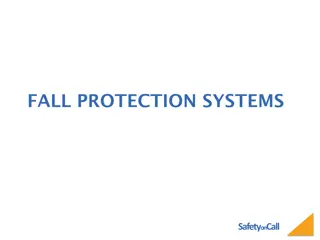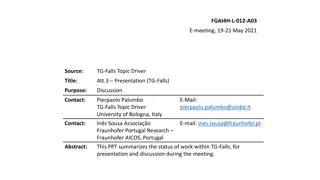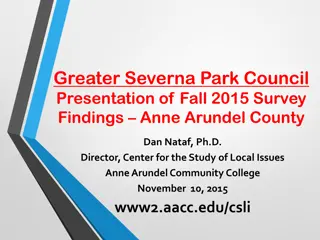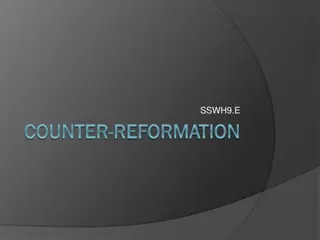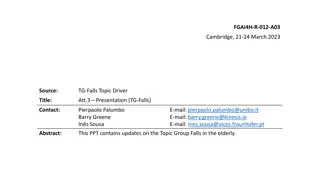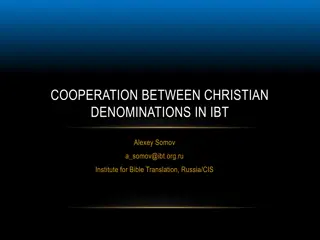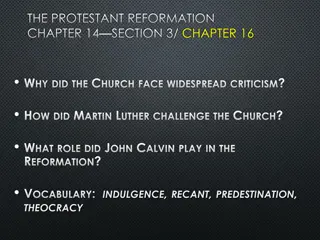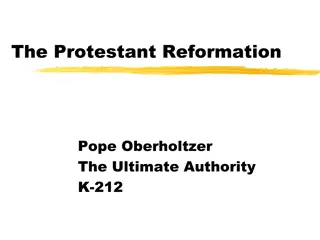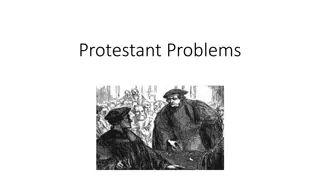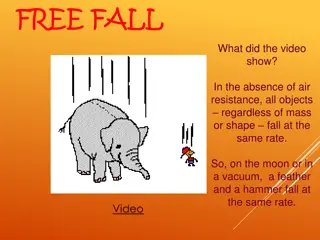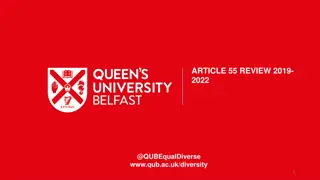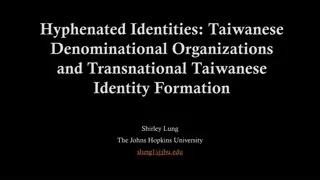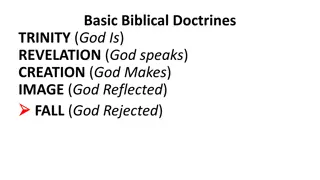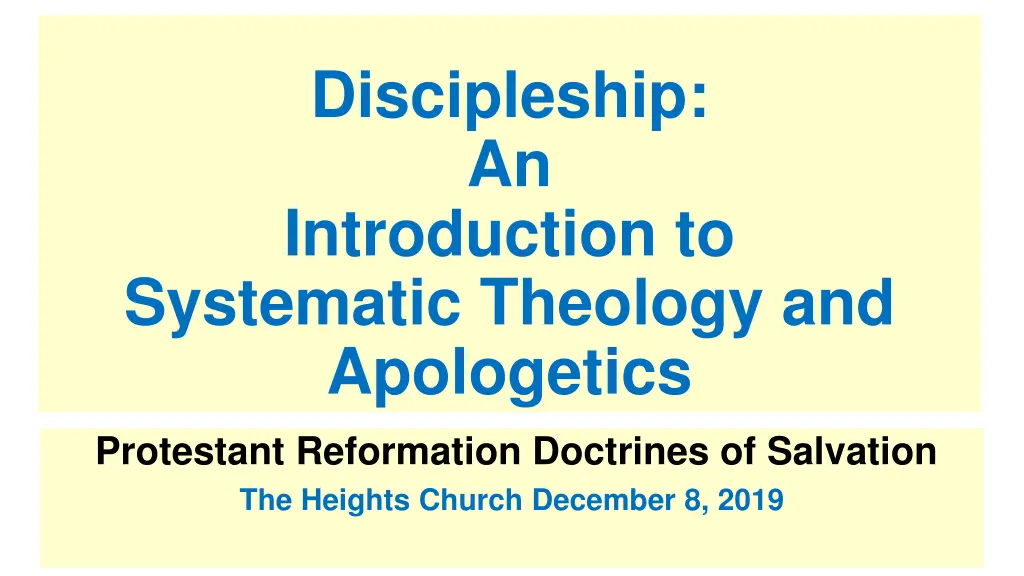
Understanding Original Sin and The Fall: Doctrines of Salvation Explained
Explore the concept of inherited sin and the effects of the Fall according to Protestant Reformation doctrines. Learn about Wayne Grudem's definition of inherited sin, biblical references outlining humanity's moral inability to not sin, and various theological perspectives on the consequences of the Fall. Delve into historical debates surrounding original sin and the diverging views of theologians like Pelagius and Augustine.
Download Presentation

Please find below an Image/Link to download the presentation.
The content on the website is provided AS IS for your information and personal use only. It may not be sold, licensed, or shared on other websites without obtaining consent from the author. If you encounter any issues during the download, it is possible that the publisher has removed the file from their server.
You are allowed to download the files provided on this website for personal or commercial use, subject to the condition that they are used lawfully. All files are the property of their respective owners.
The content on the website is provided AS IS for your information and personal use only. It may not be sold, licensed, or shared on other websites without obtaining consent from the author.
E N D
Presentation Transcript
Discipleship: An Introduction to Systematic Theology and Apologetics Protestant Reformation Doctrines of Salvation The Heights Church December 8, 2019
Original Sin/ Inherited Sin Wayne Grudem defines inherited sin as: The guilt and the tendency to sin that all people inherit because of Adam s sin. Original sin: The traditional term for what Wayne Grudem calls inherited sin.
The Fall Everyone is born morally unable to not sin (Review) None is righteous, no, not one; no one understands; no one seeks for God. All have turned aside; together they have become worthless; no one does good, not even one. (Romans 3:10-12) For I know that nothing good dwells in me, that is, in my flesh. For I have the desire to do what is right, but not the ability to carry it out. (Romans 7:18) For the mind that is set on the flesh is hostile to God, for it does not submit to God's law; indeed, it cannot. Those who are in the flesh cannot please God. (Romans 8:7-8)
The Fall Everyone is morally unable to not sin (Review) For the word of the cross is folly to those who are perishing, but to us who are being saved it is the power of God. (1 Corinthians 1:18) The natural person does not accept the things of the Spirit of God, for they are folly to him, and he is not able to understand them because they are spiritually discerned. (1 Corinthians 2:14)
The Fall Possible Effects (Review) Reformed: (Augustinian, Calvinist, Doctrines of Grace): Original sin is imputed to everyone and we are born without free will. Hence unbelievers are morally unable to not sin. Universalist: The Fall is not an actual historical event. Everyone goes to heaven when they die. Rejected by all Christians. Pelagian: Adam s sin is not imputed to anyone. Everyone has equal standing at birth with Adam before he fell. Rejected by Council of Carthage 418 and First Council of Ephesus in 431. Semi-pelagian: Original sin is imputed to everyone. However, free will is not totally lost so that everyone is able to freely choose to believe or not believe in Jesus). Rejected by the Council of Orange in 529 and Synod of Dort in 1619.
The Fall The British monk Pelagius (circa 360-418): disagreed with Augustine s prayer, Oh God, grant what Thou commandest, and command what Thou dost desire, Pelagius had no problems with the second part. He believed that God s highest attribute was His righteousness, and from that righteousness He had the perfect right Himself to obligate His creatures to obey Him according to His law. Pelagius reacted to the first part by saying that whatever God commands implies the ability of the one who receives the command to obey it. Man should not have to ask for grace in order to be obedient.
Key Protestant Reformation Doctrines Key Protestant Reformation Doctrines The Fall The Fall Semi-Pelagianism: Adam s Fall affects every naturally born person. People are free to believe or not believe in God their by own native strength. The Second Council of Orange in 529 affirmed much of the theology of Augustine of Hippo, and made numerous proclamations against what later would come to be known as Semi-Pelagian doctrine. The Reformer s recognized that Rome had become Semi-Pelagian. Following the Reformation Semi-Pelagianism was refined by the followers of Jacob(us) Arminius and John Wesley.
The Fall Augustine of Hippos Definition of Original (inherited) Sin Modern Definition/Latin term Humanity as created yes Fallen Humanity Free Agency (Liberty*) Free Will (Moral Liberty*) Able to sin Able to not sin Unable to not sin yes Ability to choose whatever is most pleasing. Ability to equally choose any available moral option. Posse peccare Posse non pecarre Non posse non peccare yes no yes yes no yes no yes * Augustine s original words
The Fall According to Augustine (354-430): Adam and Eve were created with MoralLiberty(i.e. free will), the moral ability to sin and the moral ability to not sin. In the fall they lost the moral ability to not sin. When a person is regenerated (born again) they: are indwelt by the Holy Spirit regain free will are unable to not believe in Jesus
The Fall Despite all this, all born again people are at war with the fallen world, the flesh (old fallen nature) and the Devil* as Martin Luther observed. *For we do not wrestle against flesh and blood, but against the rulers, against the authorities, against the cosmic powers over this present darkness, against the spiritual forces of evil in the heavenly places. (Ephesians 6:12)
The Fall Inparticular the flesh struggles against three lies. 1. We are autonomous and need not submit to our sovereign Creator God. 2. We are self sufficient rather than dependent on God s provision. 3. We can interpret (judge) the Bible based upon our experience in the fallen world instead of what the Bible says about our fallen nature. And the flesh struggles against two imperfections. In both of these the best we can do is to make progress, knowing we will never reach perfection in this life. 1. We sin, namely we make wrong moral decisions with our free will. 2. We make honest mistakes, namely we err.




